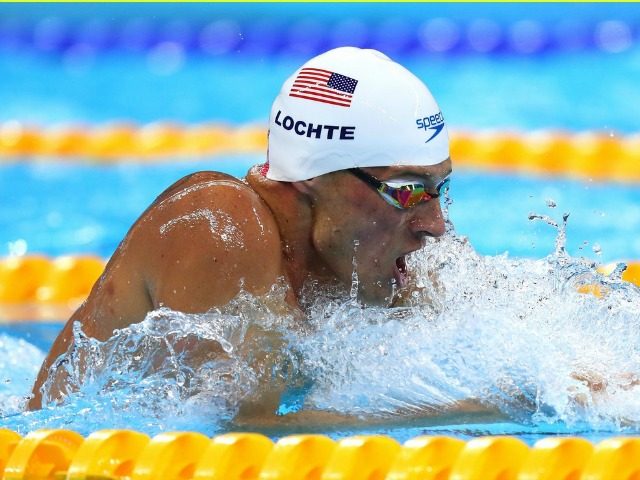Brazilian civilian police are opening an investigation into the robbery at gunpoint of American Olympics swimming champion Ryan Lochte and three other athletes, who contend men with “police badges” held them up at gunpoint and stole their wallets.
Brazilian newspaper O Globo reports that Brazil’s Special Tourism Support police team has opened an inquiry into the robbery, occurring Sunday morning as Lochte and athletes Gunnar Bentz, Jack Conger, and Jimmy Feigen were leaving a post-competition party. All victims have provided testimony to police and are cooperating in the investigation. The first order of business will be finding the taxi driver who was transporting them when the robbery occurred, as he may have been paid to bring the athletes to the robbers.
The story broke on Sunday with Ryan Lochte’s mother, Ileana, confirming that she had spoken to her son and heard the story. Both the International Olympic Commission (IOC) and its American subsidiary (USOC) denied the report, claiming to have received a denial from Lochte himself. The IOC subsequently apologized for challenging Ileana Lochte’s story, and Ryan Lochte later provided his first-hand account on NBC’s Today and thanked fans for their concern on Instagram.
https://www.instagram.com/p/BJGuJ_kBh8P/
“We got pulled over in our taxi and these guys came out with a badge, a police badge. No lights, no nothing, just a police badge,” Lochte told NBC. “The guy pulled out his gun, he cocked it, put it to my forehead and said ‘get down.’ I was like [puts hands up] I put my hands up. I was like ‘whatever.’ He took our money, he took my wallet.”
Patrick Sandusky, U.S. Olympic Committee spokesman, confirmed that the robbers were presenting themselves as police officers and pulled over the cab.
Also speaking to NBC, former Brazilian police chief Ubiratan Angelo suggested that the cab driver’s disappearance following the incident is highly suspicious. “Where is the taxi driver, (he) disappeared, nobody knows,” he noted.
Brazilian Minister of Sports Leonardo Picciani responded to an O Globo request for comment on the Lochte incident by asserting that the Olympics have been properly secured. “Security at the Games has been absolutely efficient,” he claimed. “All athletes have participated in competitions without any problems.”
Rio de Janeiro’s violent crime problem is world-renowned, and it has had a particularly difficult time curbing the criminal activity of those responsible for security. A week before the Olympics began, jiu-jitsu champion Jason Lee told media he was pulled over by military police, who groped him and forced him to withdraw money from an ATM. Two police officers have been arrested in connection with the incident, confirming they were not criminals impersonating police.
That same week, a man hired by a private security firm to work the Olympics raped a Brazilian firefighter living in the Olympic Village while she was sleeping in her village quarters.
While Picciani is correct that active athletes have been able to navigate the Olympic Village without incident, at least three attempted robberies of non-athletes have occurred there. Portugal’s minister of education and his assistant were robbed leaving an Olympic cycling competition the first day of the Games; locals tackled and beat one of the robbers, retrieving their belongings and putting the robber in the hospital.
The head of security for the Olympic Games himself has also been the target of a robbery. In that incident in the Olympic Village, however, undercover police shot the robber dead almost immediately.
A retired athlete, Russian silver medalist Yevgeny Korotyshkin, was mugged in Rio de Janeiro last week. Korotyshkin, who is in Rio in his capacity as the president of the Moscow Swimming Federation, described his parting with the robbers (and his property) as “amicable,” considering the circumstances.

COMMENTS
Please let us know if you're having issues with commenting.